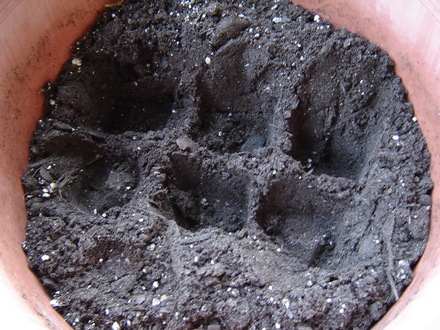Potting experiment!
By n2organics
7 comments
Earlier this week, my brother in law had given me some spare petunias that he had and I potted a few to see what happened. These were typical “Walmart or Home Depot 6-packs” that are usually severely root-bound because of the small containers:

I just hate these things because when you cut the plants out of the “six-pack”, here’s what you get:

We have root-bound plants that have been so crowded that the roots are all growing together, but the price was right. So how do I plant something like this?
I tried something new this evening and filled a pot with my best organic potting soil, then used the discarded planter to leave exact depressions in the soil:

The result was an exact replica of the planter, so there would be very little “air-gaps” in the soil and minimize any “transplant shock”:

The “test plants” were then placed in a solution of compost tea, apple cider vinegar, molasses, and seaweed extract to fully hydrate the root system before planting:

After the “test plants” were in the pot, I gave them a good “root drench” of the solution that they had soaked in to minimize any “transplant shock”:

Here is the new little babies in their new home:

Notice that I did not disturb the roots this time. I want to see if severely root bound plants can re-establish a normal root system over time.
This will be MOST interesting to watch in the following weeks because I planted a few other petunias from the same bunch using the dry-rooting method. We shall see what happens!
N2O
 28 Mar, 2010
28 Mar, 2010 4 likes
4 likes
Previous post: Cats in heaven!
Next post: Disturbance in the guest bath tonight!
Comments
I would have teased the roots out a little to encourage them to grow into the new compost, planted individually and fed in about 2 weeks time! I think perhaps your method will shock them too much?
28 Mar, 2010
It will be most interesting to see how things turn out...:>))
28 Mar, 2010
Interesting, hope they come good for you. I just plant mine after a little root "tease" and then 'cram' them into containers and hanging baskets which always seem to thrive provided I have run around all day in the Summer watering!
28 Mar, 2010
Let us know how they get on N2....
28 Mar, 2010
Mageth, the plant food that I use promotes biological activity in the soil.
A common problem in general gardening is to try to "fix the plant" with salt based, high nitrogen fertilizers. The key to any plant success is to treat the SOIL and establish a biologically balanced ecosystem around the root zone that contains the microbial fungi that attaches itself to the plant's "feeder roots".
That fungi helps the plant's root system absorb nutrients from the surrounding soil. :-)
Dry Molasses feeds the microbes in the soil and the vinegar acts as a "buffer" and pre-emergant for weeds
29 Mar, 2010
Aaah.........
29 Mar, 2010
Recent posts by n2organics
- I just love this! (Dog vs Cat)
28 Jan, 2012
- Cats in bliss!
23 Jan, 2012
- 'Tis the season!
12 Dec, 2011
- Mathimatical equation!
28 Nov, 2011
- Winter watermellons. Can it work?
21 Nov, 2011
- Colder tempratures!
13 Nov, 2011
Members who like this blog
-
Gardening with friends since
5 Sep, 2009 -
Gardening with friends since
9 Aug, 2009 -
Gardening with friends since
10 Oct, 2008 -
Gardening with friends since
9 May, 2007


very interesting method, especially the use of molasses and vinegar........what do they do for the plant N2O please?
28 Mar, 2010